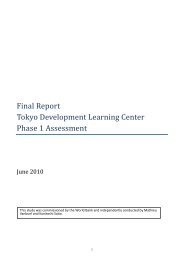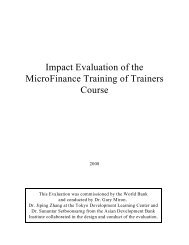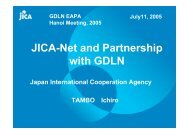Seminar Program ENG.pdf - Tokyo Development Learning Center
Seminar Program ENG.pdf - Tokyo Development Learning Center
Seminar Program ENG.pdf - Tokyo Development Learning Center
You also want an ePaper? Increase the reach of your titles
YUMPU automatically turns print PDFs into web optimized ePapers that Google loves.
CSR Practices & Knowledge sharing between Japan and India<br />
Videoconference <strong>Seminar</strong><br />
Friday, August 3, 2012<br />
10:30-13:00 in India / 14:00-16:30 in Japan<br />
The Energy and Resources Institute India, New Delhi, India<br />
World Bank <strong>Tokyo</strong> <strong>Development</strong> <strong>Learning</strong> <strong>Center</strong>, Japan<br />
Corporate Social Responsibility (CSR) activities have been playing and essential role in addressing the<br />
development needs of nations and in promoting social inclusion, particularly in developing economies. In 2009-<br />
2010, private companies in India spent $7.5 billion for CSR activities while public-sector enterprises spent an<br />
additional $700 million.<br />
To channelize CSR efforts towards attaining the Millennium <strong>Development</strong> Goals in a socially responsible manner,<br />
the World Bank is assisting India’s Ministry of Corporate Affairs (MCA) to structure its CSR work. It is doing so<br />
through the Indian Institute of Corporate Affairs (IICA), a think tank affiliated to the Ministry. The Bank has also<br />
been working closely with the IICA in structuring the National Foundation for CSR that is the model body for CSR<br />
work in India. As part of these efforts, the World Bank is providing the MCA with access to international best<br />
practices, including institutional frameworks with transparent guidelines and effective monitoring mechanisms.<br />
After the first video conference on CSR, held through the Global <strong>Development</strong> <strong>Learning</strong> Network (GDLN) in<br />
December 2011, a strong demand has emerged among CSR stakeholders in India for learning from international<br />
best practices in the field.<br />
Japan has been chosen as the first country for this international knowledge exchange because the nation has<br />
undergone a transition similar to the one that India is going through. A new network and platform for collaboration<br />
between corporations, government organizations, and civil society organizations (CSOs) has also emerged. In<br />
addition, the movement for BoP (Base of the Pyramid) business, or so-called “Inclusive Business,” has been<br />
active since 2009, when the Government of Japan, including Japan International Cooperation Agency (JICA),<br />
officially strengthened its supports to promote such business. Many Japanese corporations are interested in<br />
incorporating poverty reduction and economic development aspects into their core business or their CSR work.<br />
The most popular country for implementation is India. Japanese corporations are also interested in opportunities<br />
for collaboration with organizations in India. The interaction between Japanese and Indian corporations is<br />
expected to lead to a substantial transfer of ideas from CSR as practiced in Japan for possible adoption by Indian<br />
businesses in their CSR agendas.<br />
India has a rich tradition of CSR since ancient times. Large Indian companies are now transitioning from<br />
philanthropy to a rapidly evolving strategic engagement in development issues. India has already created<br />
structures and is in process of enactment of a Companies Bill that will make CSR a voluntary, but necessary,<br />
engagement for business. <strong>Learning</strong> gleaned from these collaborative initiatives will therefore help India develop<br />
its own frameworks.
In response to this demand, IICA, JICA, the World Bank and the Global <strong>Development</strong> <strong>Learning</strong> Network (GDLN)<br />
will jointly organize a video conference-based seminar to exchange practice and knowledge on CSR in India and<br />
Japan.<br />
Target Audience<br />
Companies interested in learning about CSR practices from Japan as well as NGOs and CSOs exploring<br />
partnerships with Japanese corporations can apply to participate in this videoconference seminar. Through<br />
attending this seminar, participants will be able to:<br />
• Understand CSR development and challenges in India and Japan (actors, policies to enhance CSR,<br />
collaboration with NGOS, and other stakeholders, etc)<br />
• Obtain practical lessons on CSR activities from actual cases from India and Japan<br />
• Exchange information on markets and players for BOP business for India and Japan<br />
Time<br />
Time Duration <strong>Program</strong> Speaker<br />
( India) (Japan)<br />
10:00-10:30 13:30-14:00 30 min. Registration (VC pre-connection)<br />
10:30-10:40 14:00-14:10 3 min Opening Remarks Mr. Roland Lomme, <strong>Program</strong><br />
Manager, World Bank India<br />
3 min Welcome Remarks Mr. Jin Wakabayashi,<br />
Director, Private Sector<br />
Partnership Division, Office for<br />
Private Sector Partnership,<br />
JICA<br />
4 min Objectives of the <strong>Seminar</strong> Ms. Shabnam Sinha, Senior<br />
Education and Institutional<br />
<strong>Development</strong> Specialist, World<br />
Bank India<br />
10:40-10:50 14:10-14:20 10 min Keynote Remarks: -Setting the Stage-<br />
Mr. Manoj K Arora, Additional<br />
• Overview of CSR in India<br />
- Evolution of CSR and challenges in India (role of public<br />
& private enterprises, regulations etc)<br />
- Collaboration with social enterprises and civil society<br />
- BOP issues<br />
Director General, Directorate<br />
of Export Promotion, Ministry<br />
of Finance (Representing Dr.<br />
Chatterjee, IICA)<br />
10:50 –11:10 14:20-14:40 10 min<br />
Sharing Japanese Experience:<br />
• CSR development and challenges in Japan<br />
- Evolution of CSR and challenges in Japan<br />
- Actors and their roles & responsibility in CSR/BOP<br />
(METI, JETRO, JICA, university, company, and NGO<br />
etc).<br />
- Regulations, policies, and guidelines for CSR in Japan<br />
Ms. Makiko Akabane,<br />
Director, CSR Asia Japan<br />
10 min<br />
11:10-12:10 14:40-15:40 60 min (10<br />
min each)<br />
• Collaboration with NGOs by JANIC<br />
- Role of JANIC<br />
- Types of partnerships between companies and NGOs,<br />
and guidelines<br />
Case presentations by selected companies:<br />
- Brief corporate overview and CSR/BOP activities,<br />
organizational set-up and strategy with core business<br />
activities<br />
- Challenges and opportunities<br />
- Monitoring and evaluation<br />
Ms. Azusa Ibata, Japan NGO<br />
<strong>Center</strong>s for International<br />
Cooperation (JANIC)<br />
Representatives from<br />
selected companies in<br />
Japan and India*<br />
Japan : Eisai, Felissimo<br />
India: TATA, Intel, Bharti<br />
Foundation of Airtel, Dalmia<br />
(*Please see the Speaker<br />
Organization Profile.)<br />
12:10-12:55 15:40-16:25 45 min Open Discussion and Next Steps Chaired by Ms. Sinha, World<br />
Bank India<br />
12:55-13:00 16:25-16:30 5 min Closing Remarks Ms. Sinha, World Bank India<br />
Moderator<br />
Shabnam Sinha, Senior Educational and Institutional Specialist, South Asia Human <strong>Development</strong> Sector,<br />
the World Bank
















